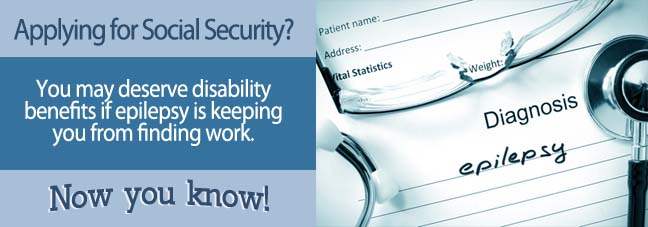Epilepsy is the fourth most common neurological disorder in the U.S. People of all ages can be affected by epilepsy, which can cause unpredictable seizures as well as other health problems. While it is definitely possible to live a normal life with this disorder, others have more severe and continuous symptoms that make working and living difficult.
Fortunately, for those in this position, disability benefits may be able to help. Social Security disability benefits are funded by the government and are designed to help people in need. Continue below to see how your epilepsy may qualify.
Step One: Determine how much your epilepsy limits you.
Before applying for Social Security, it is important to take note of the ways in which your epilepsy affects you in your day-to-day routine. When the Social Security Administration (SSA) evaluates your application, they will need to confirm that you qualify as “totally and permanently disabled.” To help prove this, you will need to assess and document all of the ways epilepsy keeps you from working or living normally.
For example, one of the main problems epilepsy causes is unpredictable seizures. Say you are a teacher that experienced a seizure while on the job — this could be a detriment not only to your own health, but to the well-being and safety of the children you supervise. This diagnosis could also cause complications in going outdoors regularly, as certain stimuli could put you at higher risk for seizures or other severe epileptic symptoms.
If you can trace the cause of problems like these to your epilepsy diagnosis, then there is a good chance that disability benefits may be right for you.

Step Two: Consult the Blue Book and retrieve test results confirming the severity of your epilepsy.
When evaluating applications, the SSA compares your diagnosis to the “Blue Book.” This list contains all qualifying disabilities as well as the tests and symptoms required to be approved for them.
Epilepsy is listed under Blue Book Section 11: “Neurological Disorders – Adult.” To qualify, applicants must experience multiple generalized tonic-clonic seizures, dyscognitive seizures, or a combination of both within a certain time period in order to be considered “totally and permanently disabled.”
Additional limitations in physical or mental functioning may also contribute to the SSA’s decision on a case. To show this on your application, you can provide CAT scans, MRIs, physicians’ notes, therapy session notes, hospitalization records, medication lists, or even testimonies from friends and family that document your symptoms.
In essence: the more your epilepsy limits you, the more likely you are to receive benefits.
Step Three: Gather tax info, work history, and prepare to fill out the application.
The Social Security disability application also requires more technical requirements in order for an applicant to be approved. This information not only gives further insight into your lifestyle, but can also help determine which Social Security program you qualify for.
Tax information allows the SSA to see the amount of money you have contributed to Social Security in prior years. If a person has contributed enough money (or “credits”) to Social Security in their working years, then they may qualify for Social Security disability insurance (SSDI).
Work history is also provided to demonstrate what types of work you have experience in as well as when/if you stopped working. This will help the SSA determine whether or not you may be able to find less demanding work elsewhere instead of receiving monthly government payments.
In addition, if a person has no work history (i.e., if they’re either under 18 or unemployed) then this helps the SSA determine their qualifications under Supplemental Security Income (SSI) instead. The SSA will then try to find which benefits are the best fit for that particular situation.
Contacting a Social Security Attorney
Applying for disability can sometimes be overwhelming. If you feel that you may qualify for disability benefits, consider consulting a disability advocate or attorney. They can help with filling out applications, keeping paperwork organized, and aiding you in the appeals process if necessary. It is also required by law that disability attorneys will not receive payment unless you win your case.
To give yourself the best chance at receiving benefits for your epilepsy, consider speaking with a disability attorney today.